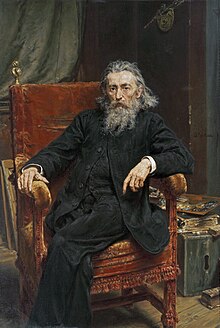Jan Alojzy Matejko (Polish pronunciation: [jan aˈlɔjzɨ maˈtɛjko] (![]() listen); also known as Jan Mateyko; 24 June 1838[nb 1] – 1 November 1893) was a Polish painter. He is generally regarded as the greatest one in the 19th century.
listen); also known as Jan Mateyko; 24 June 1838[nb 1] – 1 November 1893) was a Polish painter. He is generally regarded as the greatest one in the 19th century.

Biography
changeJan Matejko was born in Kraków (Cracow).[2] on 24 June 1838.[3] His father was Czech musician František Xaver Matějka (in Poland Franciszek Ksawery Matejko), a music teacher. His mother was Joanna Karolina Rossberg, who was half-German.[2] He was never good at school.[2] He never learned a foreign language well.[2] However, he showed great artistic talent.[2]
He studied at the School of Fine Arts in Kraków from 1852 to 1858.[2] His professors were Wojciech Korneli Stattler and Władyslaw Łuszczkiewicz.[2] He also studied in Munich and Vienna.[2] Then he returned to Kraków and stayed in the town for the rest of his life.[2] He was the principal of the Academy of Fine Arts in Kraków.[2] Among his students were Jacek Malczewski, Józef Mehoffer and Stanisław Wyspiański.[3]
Matejko died on 1 November 1893 in Kraków.[3] He is buried at Rakowicki Cemetery in Kraków.[2]
Works
changeMatejko is famous for his historical paintings.[4] He painted portraits, too, especially those of his children. His best known paintings are Astronomer Copernicus - Conversation with God, Hanging of the Zygmunt bell, Prussian Homage and Battle of Grunwald. He also published a book named Portraits of Polish Kings (1890).[2] Most of these portraits are imaginary, meaning he painted kings and princes who lived many centuries before. There are no earlier pictures of them.
Notes
changeReferences
change- ↑ Maria Szypowska (2016). Jan Matejko wszystkim znany (in Polish). Fundacja Artibus-Wurlitzer oraz Wydawn. Domu Słowa Polskiego. pp. 7–8. ISBN 9788377858448.
- ↑ 2.00 2.01 2.02 2.03 2.04 2.05 2.06 2.07 2.08 2.09 2.10 2.11 "Jan Matejko, Biography". Archived from the original on 2016-08-22. Retrieved 2016-10-20.
- ↑ 3.0 3.1 3.2 Jan Matejko, Encyklopedia PWN
- ↑ Encyclopaedia Britannica